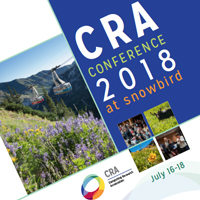
CRA Conference at Snowbird Program Update
The program for the 2018 CRA Conference at Snowbird has recently been updated. A preliminary program agenda with session descriptions is now available.

Published: April 2018, Issue: Vol. 30/No. 4, Download as PDF
Archive of articles published in the April 2018, Vol. 30/No.4 issue.

The program for the 2018 CRA Conference at Snowbird has recently been updated. A preliminary program agenda with session descriptions is now available.
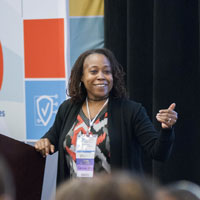
Approximately 100 graduate students in computing and more than 20 speakers assembled on March 16-17 in San Diego, CA, to convene the inaugural CRA Graduate Cohort for Underrepresented Minorities and Persons with Disabilities (URMD Grad Cohort). It was the first gathering of its kind hosted by CRA. This new iteration of the Grad Cohort Workshop focused on the following underrepresented groups in computing: Alaska Native, Black/African American, Hispanic, Native American, Native Hawaiian and other Pacific Islander, and persons with disabilities. The workshop aimed to increase representation from these groups in computing research by building and mentoring nationwide communities through their graduate studies, and is modeled on the highly successful CRA-W Grad Cohort Workshop for Women.

CRA-E’s new “Undergraduate Research Highlights” series showcases outstanding research done by undergraduate students at universities and colleges across North America. It is one of a number of CRA-E’s activities that foster and recognize talented computing researchers with the goal of increasing the research pipeline, promoting graduate education, and advocating research-based careers.
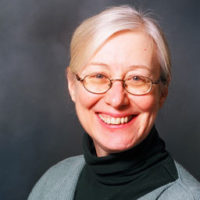
My research sits at the intersection of Natural Language Processing (NLP) and speech processing. I have focused on identifying the role of prosodic information in speech and using this knowledge to produce more realistic Text-to-Speech Synthesis (TTS) systems; to detect many types of speaker state, including the classic emotions, such as anger, disgust, fear, happiness, sadness, and surprise; and derived emotions, such as confidence and uncertainty, deception, trust, and charisma. I’ve also studied human-machine and human-human behavior in Spoken Dialogue Systems (SDS) and Human-Computer Interaction (HCI).
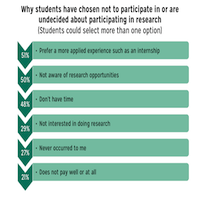
CERP data indicate most undergraduate students have not participated in formal research during their college career to date. When asked whether those students plan to pursue formal research before they graduate, many indicate they are unsure or do not plan to do so. This infographic presents students’ reasons for uncertainty or lack of interest.
Though it required negotiations that stretched nearly seven months into the fiscal year it is designed to fund, the FY 2018 Omnibus Appropriations act won the approval of a sizable majority in Congress and the reluctant approval of the President at the end of March, providing substantial boosts in Federal spending, including healthy increases to science investments across the government.
Passage of the omnibus bill was made possible by an agreement in February to increase statutory limits on discretionary spending for FY 2018 and FY 2019. That extra spending room ensured that congressional appropriators could boost military spending sufficiently to satisfy a majority of the GOP and increased non-defense spending sufficiently to woo enough congressional Democrats to overcome opposition from the conservative Freedom Caucus in the House. In the end, the 2,000+ page bill boosts Federal discretionary spending to $1.3 trillion in FY 18, and boosts Federal R&D efforts by nearly 13 percent.
While appropriators generally do not spread funding increases evenly throughout the bill, overall, science agencies fare well in the bill, in many cases receiving meaningful increases for the first time in several years.
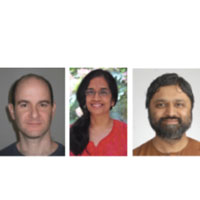
Great Innovative Idea is from Tamraparni Dasu, Yaron Kanza, and Divesh Srivastava, of AT&T Labs-Research. They were one of the Blue Sky Award winners at the ACM SIGSPATIAL 2017 conference.
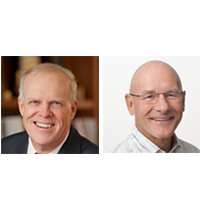
ACM has named John L. Hennessy, former president of Stanford University, and David A. Patterson, professor emeritus of the University of California, Berkeley, recipients of the 2017 ACM A.M. Turing Award for pioneering a systematic, quantitative approach to the design and evaluation of computer architectures with enduring impact on the microprocessor industry. Patterson is a former CRA Board Chair and will be a plenary speaker at the 2018 CRA Conference at Snowbird, and Hennessy was a plenary speaker at the 2012 CRA Conference at Snowbird.

After serving for more than five years as CERP director, Jane Stout has left CRA to pursue a senior project director position with YOUGOV. During Jane’s tenure at CRA, she oversaw the Data Buddies Project; led CERP in evaluation work for the CRA-W, CCC, and CRA-E; and obtained an NSF award to conduct computing education research focusing on diversity. Jane also gave numerous talks and interviews on the importance of diversity in computing and shared CERP’s research findings with the computing community.
While she will be missed by her colleagues at CRA, CERP, and the CRA-W community, we wish all the best for her as she embarks on this next stage of her career.
This website uses cookies so that we can provide you with the best user experience possible. Cookie information is stored in your browser and performs functions such as recognising you when you return to our website and helping our team to understand which sections of the website you find most interesting and useful. You can adjust all of your cookie settings.
